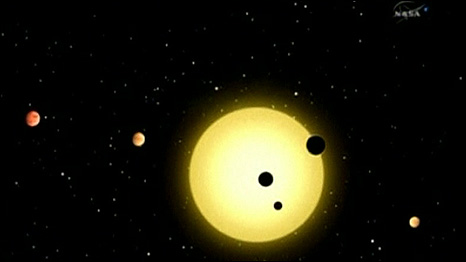Six New Planets 科學(xué)家發(fā)現(xiàn)6顆行星
Six New Planets 科學(xué)家發(fā)現(xiàn)6顆行星
By Neil Bowdler, BBC News

Kepler measures stars' "light curves" as planets block some of their light
媒體英語(yǔ)會(huì)帶大家一起學(xué)習(xí)BBC撰稿人在報(bào)道世界大事時(shí)常用到的單詞和短語(yǔ)。
Background:科學(xué)家近日通過(guò)“開(kāi)普勒”太空望遠(yuǎn)鏡觀測(cè)到一個(gè)距離地球2000光年的奇特行星系統(tǒng)。其恒星與太陽(yáng)相似,并有6顆行星圍繞它運(yùn)行。
收聽(tīng)與下載
Finding six new planets around a single star represents an impressive haul. Nasa is calling it the best find since the first so-called ‘exoplanet’ was discovered 16 years ago. It might not be the most populated solar system yet found - six or possibly seven planets have been found in a rival system, but it's the nature of this new discovery which is getting the astronomers scratching their heads in wonder.
Five of the six planets are crammed tightly in around the Kepler-11 star, with orbits of between just ten and 47 days. That means they're all super hot, but the data suggests they're also made mostly of gas.
That's strange, because small hot planets this close in should have been ripped asunder by their parent star in their formative years, say the scientists. One possible explanation is that the planets started out bigger and further out and were slowly dragged into tighter orbits, as part of a contracting belt of dust and asteroids.
Glossary 詞匯表 (收聽(tīng)發(fā)音, 請(qǐng)單擊英語(yǔ)單詞)
- impressive奇特的,轟動(dòng)的
- haul(一次發(fā)現(xiàn)的)數(shù)量
- so-called所謂的
- exoplanet外星球
- to scratch (one’s) head感到不解
- to cram 擠在(狹小的軌道空間內(nèi))
- orbit 軌道
- to rip asunder 炸成碎片
- formative years 形成期
- to drag 拖入
- to contract 收縮
- asteroid 小行星
相關(guān)鏈接
- DNA diagnosis revolution 基因研究帶來(lái)診斷革命
- Squirrels are 'climate culprit' 松鼠是"氣候變化的罪魁禍?zhǔn)?
- Door opens for new Olympic sports 為新運(yùn)動(dòng)項(xiàng)目敞開(kāi)奧運(yùn)大門(mén)
- HIV evolving 'into milder form' 艾滋病毒“毒性”減弱
- EU investment plan 歐盟主席公布巨額投資方案重振歐盟經(jīng)濟(jì)
- UK to lead Moon landing in 10 years 英國(guó)牽頭十年登月計(jì)劃